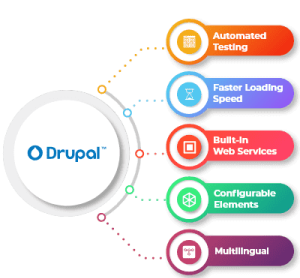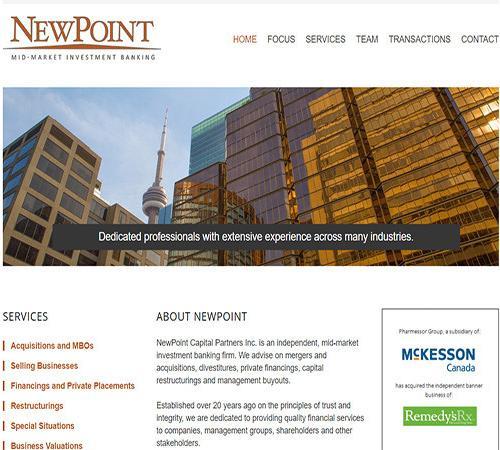Drupal web design is often the preferred choice for organizations requiring a robust, flexible, and scalable platform to handle complex digital experiences. Unlike simpler content management systems, Drupal is built as a powerful framework capable of managing large volumes of diverse content. Also, Drupal includes intricate user roles and permissions, and sophisticated workflows.  This makes it ideal for websites that go beyond basic informational pages and require advanced functionality, integrations with other systems, or the ability to evolve significantly over time.
This makes it ideal for websites that go beyond basic informational pages and require advanced functionality, integrations with other systems, or the ability to evolve significantly over time.
You need Drupal web design when your project demands a high level of customization and control. Its modular architecture allows developers to build tailored solutions using a wide array of contributed modules. Web developers can create custom ones too, ensuring the website precisely meets unique business needs. This adaptability is crucial for creating distinct online presences that stand out and provide specific user experiences that off-the-shelf solutions cannot easily replicate. Drupal’s inherent focus on security also makes it a trusted platform for websites handling sensitive data or requiring stringent compliance.
Ultimately, Drupal web design is necessary for ambitious web projects. Projects that prioritize long-term growth, complex content strategy, and enterprise-level performance and security. Governments, educational institutions, large corporations, and media organizations frequently turn to Drupal. Specifically for its ability to support large-scale, content-heavy, and highly interactive websites. If your vision for your website involves more than just a simple online brochure and requires a powerful, extensible, and secure digital foundation, Drupal is likely the appropriate technology.
Drupal’s Strong Security
Drupal is recognized for its strong stance on security, a critical factor for websites handling sensitive data or experiencing high traffic. A key element of this is the dedicated Drupal Security Team, a group of experienced volunteers and paid professionals who proactively monitor for vulnerabilities in both Drupal core and contributed modules. This team follows a well-defined process for confidentially receiving, evaluating, and addressing potential security issues, releasing patches and security advisories promptly to inform and protect the Drupal community.

This vigilant and collaborative approach significantly minimizes the window of opportunity for malicious attacks, making Drupal a trusted platform for governments, financial institutions, and large enterprises.
Reliability of Drupal
The reliability of Drupal stems from its robust and scalable architecture. Designed as a modular framework, it allows for the development of complex applications while maintaining stability. Its strong database abstraction layer and caching mechanisms ensure efficient performance even under heavy loads. Drupal’s adherence to open web standards and its continuous development by a large global community contribute to its stability and long-term viability. The availability of extensive documentation and community support also means that issues can be quickly identified and resolved, further enhancing its dependability.
Enterprise-grade
Together, Drupal’s focus on security and its inherent reliability make it an enterprise-grade content management system. The rigorous security measures, coupled with a stable and scalable architecture supported by a dedicated community, provide a solid foundation for mission-critical websites and digital platforms. This makes Drupal a confident choice for organizations that require a secure, stable, and high-performing online presence capable of adapting to future needs and challenges.





 This makes it ideal for websites that go beyond basic informational pages and require advanced functionality, integrations with other systems, or the ability to evolve significantly over time.
This makes it ideal for websites that go beyond basic informational pages and require advanced functionality, integrations with other systems, or the ability to evolve significantly over time.

 DTW stands out as an exceptional choice for Drupal web development in Toronto due to its deep understanding of the platform’s enterprise-grade capabilities and its commitment to delivering measurable business outcomes. For businesses in Vaughan and across the GTA that require robust, scalable, and highly secure digital solutions, DTW’s expertise in Drupal is invaluable. They don’t just build websites; they craft powerful digital ecosystems designed for high traffic, complex integrations, and future growth. DTW’s proficiency with Drupal’s advanced features, such as its sophisticated caching mechanisms, flexible content modeling, and robust API-first architecture, ensures that your website will perform optimally, handle vast amounts of data, and seamlessly integrate with your existing business systems. This strategic approach provides a reliable and future-proof foundation for any Toronto business aiming for long-term online success.
DTW stands out as an exceptional choice for Drupal web development in Toronto due to its deep understanding of the platform’s enterprise-grade capabilities and its commitment to delivering measurable business outcomes. For businesses in Vaughan and across the GTA that require robust, scalable, and highly secure digital solutions, DTW’s expertise in Drupal is invaluable. They don’t just build websites; they craft powerful digital ecosystems designed for high traffic, complex integrations, and future growth. DTW’s proficiency with Drupal’s advanced features, such as its sophisticated caching mechanisms, flexible content modeling, and robust API-first architecture, ensures that your website will perform optimally, handle vast amounts of data, and seamlessly integrate with your existing business systems. This strategic approach provides a reliable and future-proof foundation for any Toronto business aiming for long-term online success.








Recent Comments